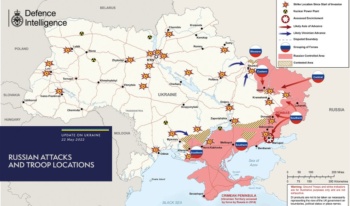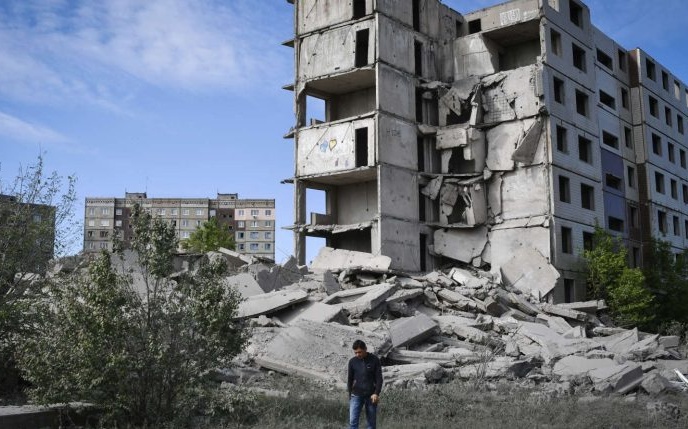A man walks in front of his home, in a residential building destroyed by Russian shelling, in Kramatorsk in eastern Ukraine, May 25, 2022 (Andriy Andriyenko/AP)
Wednesday’s Coverage: “The Fate of This Country Is Perhaps Being Decided Now”

1307 GMT:
At least four civilians have been killed and several injured by Russian shelling of Ukraine’s second city of Kharkiv, according to regional governor Oleh Synyehubov.
He urged residents of the city to go to shelters.
The Ukraine military said two weeks ago that it had pushed the Russians out of artillery range of Kharkiv, after Vladimir Putin’s forces had failed to overrun the city.
UPDATE 1125 GMT:
Updating on the Russian offensive in eastern Ukraine, Luhansk military governor Serhiy Haidai says the Russians shelled Ustynivka and the nearby city of Lysychansk on Wednesday, killing three people.
Haidai said a shell hit a humanitarian aid center and a volunteer car delivering food. Destroyed buildings included 11 high-rises in Sievierodonetsk; eight high-rises and private houses, a house of culture, and the Administration Services Centre in Lysychansk; four houses in Privillya; and two each in Novodruzhesk and Hirske.
The governor claimed 10 Russian attacks were repelled, with the destruction of four tanks, two artillery systems, an armored personnel carrier, and a motor vehicle and the downing of five drones.
UPDATE 1110 GMT:
Two more Russian soldiers have pleaded guilty to war crimes in Ukraine.
Alexander Bobikin and Alexander Ivanov admitted they were in an artillery unit that fired from Russia’s Belgorod at targets in the Kharkiv region in northeast Ukraine. The shelling destroyed school in the town of Derhachi.
Bobikin and Ivanov, an artillery driver and a gunner, were captured after they crossed the border and continued the shelling.
Prosecutors have asked for sentences of 12 years. A defense lawyer said the terms should be shorter because the two soldiers were following orders and repented of their crimes.
The verdict is expected on May 31.
Earlier this week, Russian Sgt. Vadim Shishimarin was sentenced to life in prison for shooting and killing a 62-year-old man in the Sumy region of northeast Ukraine.
UPDATE 1105 GMT:
A pro-Ukrainian outlet posts video allegedly showing Russian use of white phosphorus, banned in populated areas under international law, in its offensive in eastern Ukraine.
russian forces shelling Ukrainian positions with white phosphorus ammo in #Donbas pic.twitter.com/wgSGfbfzVr
— Euromaidan PR (@EuromaidanPR) May 26, 2022
UPDATE 0820 GMT:
The Norwegian mining corporation Equinor has confirmed its withdrawal from four joint ventures in Russia with Russian energy company Rosneft.
Equinor had operated in the Russian Federation for more than 30 years and signed a strategic partnership agreement with Rosneft in 2012. But it said in a statement on Wednesday that it has its shares, after investing $1.2 billion, and is “released from future obligations”.
The company said the decision for withdrawal was made on February 27, three days after the start of the Russian invasion of Ukraine. The company suspended investments and stopped trading in Russian oil, gas, and their derivatives.
Equinor was one of the largest Western investors in Rosneft’s projects. The Norwegians provided technologies for the development of the Arctic shelf and hard-to-recover reserves.
Rosneft is included in the sanctions lists of the European Union, which has allowe only “transactions to meet critical needs” since May 15.
UPDATE 0610 GMT:
Russia has suffered heavy losses among its elite units, UK military intelligence assesses.
The analysts cite Russian failure to anticipate Ukrainian resistance and complacency of Russian commanders.
The misemployment of the VDV [elite airborne forces] in Ukraine illustrates how Putin’s significant investment in the armed forces over the last 15 years has resulted in an unbalanced force.
They note the VDV’s involvement in high-profile defeats such as the failure to capture Hostomel airfield near Kyiv at the outset of the invasion — foiling Vladimir Putin’s initial plan to topple the Zelenskiy Government — and the recent “failed and costly crossings of the Siverskyi Donets river”, in which an entire Russian battalion tactical group was destroyed with an estimated loss of 500 Russian troops.
The VDV has been employed on missions better suited to heavier armoured infantry and has sustained heavy casualties during the campaign. Its mixed performance likely reflects a strategic mismanagement of this capability and Russia’s failure to secure air superiority.
UPDATE 0522 GMT:
Russia’s invasion of Ukraine has destroyed or damaged at least 56 schools, an investigation by the Associated Press and US Public Broadcasting Service has found.
The Zelenskiy Government says Russia has shelled more than 1,000 schools, destroying 95.
The investigation portrays the destroyed schools, with slain teachers on the ground or slumped in their chairs, surrounded by books and papers smeared in blood.
In some cases, the Russians used cluster munitions, banned under international law.
ORIGINAL ENTRY: The Zelenskiy Government has bluntly rejected the cession of any territory to Russia in the face of Vladimir Putin’s invasion.
Presidential adviser Oleksiy Arestovych responded to “some European nations” who have called for the cession in return for an end to Putin’s invasion.
No one is going to trade a gram of our sovereignty or a millimeter of our territory.
Our children are dying, soldiers are being blown apart by shells, and they tell us to sacrifice territory.
Get lost. It’s never going to happen.
In his nightly video address to the nation, President Volodymyr Zelenskiy also had a riposte for foreign commentators, such as editors of The New York Times and former US Secretary of State Henry Kissinger, who say Kyiv should accept Russian annexation of some areas.
Symptomatic editorials began to appear in some Western media stating that Ukraine must allegedly accept so-called difficult compromises by giving up territory in exchange for peace….
{We] actually live in the territory they propose to exchange for the illusion of peace.
Zelenskiy chided that the pundits are “stuck” in previous centuries and living in a time “when the interests of nations were indeed often traded for attempts to appease the appetites of dictators”.
It seems Mr. Kissinger’s calendar is not 2022 but 1938 [when European countries accepted German annexation of Czechoslovakia], and he thought he was taking to an audience not in [the World Economic Forum at] Davos but in Munich of that time.
In 1938, when Mr. Kissinger’s family was fleeing Nazi Germany, he was 15 years old. He understood everything perfectly, and nobody heard from him that it was necessary to adapt to the Nazi instead of fleeing them or fighting them.
Speaking in Sweden, Estonian Prime Minister Kaja Kallas, noted:
It is much more dangerous giving in to Putin than provoking him.
All these seemingly small concessions to the aggressor lead to big wars. We have done this mistake already three times: Georgia, Crimea and Donbas….
We cannot give anything to the aggressor that it didn’t have before – or the aggression will sooner or later return. No sign Russia has changed its calculus. I don’t believe in goodwill by an outright aggressor and a cold-blooded war criminal. We must avoid a bad peace. A badly negotiated peace for Ukraine would mean a bad peace for us all.
Russians “On Outskirts” of Sievierodonetsk in East
Zelenskiy and Arestovych spoke as Russia pressed its offensive in eastern Ukraine, trying to surround Sievierodonetsk, the easternmost city held by the Ukrainians.
Luhansk military governor Serhiy Haidai said that Russian forces are “on the outskirts” of the city. He added that the area has no gas and limited water and electricity after the last gas supply station was struck by the Russians.
Police in Lysychansk, across the Siverskyi Donets River, are collecting bodies of the slain and burying them in mass graves, Haidai said. including 150 people in a mass grave in a Lysychansk district.
Driving at the roads of #Donbas in eastern #Ukraine️ #UkraineRussiaWar pic.twitter.com/GpcPVIzW3l
— Aris Messinis (@ArisMessinis) May 23, 2022
The head of Ukraine military intelligence, Kyrylo Budanov, said delays in the arrival of military assistance on the frontline had left Kyiv “catastrophically short of heavy weapons”. Zelenskiy echoed in his address, “We need the help of our partners — above all, weapons for Ukraine. Full help, without exceptions, without limits, enough to win.”
Foreign Minister Dmytro Kuleba told the World Economic Forum in Davos that Ukraine “badly” needs multiple launch rocket systems. He chided that while the European Union had made “revolutionary” decisions to help Ukrainians, “NATO as an alliance, as an institution, is completely sidelined and doing literally nothing. I’m sorry to say it.”
“The battle for Donbas is very much like the battles of the Second World War.
Some villages and towns, they do not exist anymore. They were all turned into rubble by Russian artillery fire, by Russian multiple launch rocket systems. It’s devastating.
Aftermath of a Russian missile attack on a train station in Pokrovsk in the Donetsk region:

